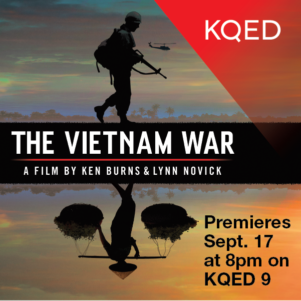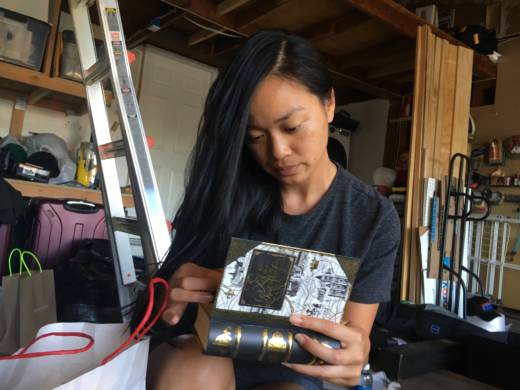Stories like these trickled out during Le’s childhood in San José. It was always hush-hush. So Le doesn’t remember that much. What she remembers about her parents is how angry they were.

Le remembers one day when she was 6. She was in first grade and she forgot her backpack at home.
“And no one could understand why I was so worried about that. But when I got home, my mom found out and she just lost her mind,” Le says. “We had this plastic Fisher-Price table. She kicked that thing across the room and hit the wall so hard it terrified me.”
Le says it was like this all the time. She forgot her books when they went to the library, and her mom started screaming. When her sister messed up a sauce for dinner, her dad threw a dish at the wall.
“Sometimes I just didn’t even know what I was dealing with,” she says.
She came to dread every day. And it also took her hours to fall asleep.
“Having that kind of anxiety about what mistakes I might make the next day, it would keep me up at night,” she says. “I think that’s where my anxieties over making mistakes started.”
As a kid, Le figured, her family was just like all the other Vietnamese families in the community. She assumed everybody’s parents wanted their kids to be serious about school and remember their backpacks.
“The belief is a cultural piece. But the reaction is influenced by trauma,” says Dr. Clayton Chau, a psychiatrist at St. Joseph Hoag Health in Irvine. “So parents without trauma would sit the child down and say, ‘Hey, what happened? How can we ensure that you have your backpack, and the importance of having your backpack?’ Versus, if she was traumatized then immediately she would just explode, with no control.”
Chau says he sees this with a lot of Vietnamese families who suffered terrible losses during or after the war. If parents don’t resolve the trauma they experienced, their kids can inherit it. It’s partly genetic (PDF) — trauma can alter genes, which get passed down to the next generation. And it’s partly behavior, usually unconscious.
“Children who grow up in that environment develop a lot of anxiety and are very unsure of themselves,” Chau says. “Because if parents who are supposed to love you react that way, how can you have any prediction for strangers?”
The phenomenon is called the intergenerational transfer of trauma and was first recognized in the 1960s in the children of Holocaust survivors. It has since been identified in lots of groups, including kids of Cambodian and Vietnamese refugees. But while the Jewish mode of managing trauma is commemoration and remembering, in some Buddhist cultures people cope by letting go of things that can’t be changed or focusing on the future.
For My-Linh Le’s family, the kids were the future.
“When I was in high school, my parents decided for me that I was going to be a pharmacist,” Le remembers. “I was given no say in this.”
As Le got older, her parents became more controlling. Because they had lost so much, they were obsessed with her safety. Le says they would listen in on all her phone conversations, and wouldn’t let her walk anywhere. She never learned how to ride the bus, because her parents insisted on hiring drivers to take her to school.
“Even my friends and my friends’ parents felt bad for me,” she says. “They would actually lie to my parents for me sometimes so that I could go to the movies or something.”
Le got really good at suppressing her own anger and frustration, so she wouldn’t set her parents off. But now, as an adult, she’s started to notice little ways that this family habit is catching up with her. She was on the phone with her boyfriend recently.
“And he didn’t do something that I thought he should have done by a certain time,” she says. “And this rage just suddenly came out of nowhere, just like totally bubbled up within me.”
She wanted to throw the phone across the room.
“It was this really depressing moment of realizing that I’m just like my mother,” she says.
Le recently asked her parents if she could interview them, ask them about the things that happened to them that she had always been told not to talk about. She was surprised when they said yes.
“It wasn’t about forgiving anybody,” she says. “It wasn’t about me working through any of my own feelings.”
But it was a way of figuring out who she was, and where these different parts of herself came from.
Her dad told her about his first wife and their two sons. He was a helicopter pilot in the South Vietnamese air force. Then spent three years in a concentration camp after the war. He later made it to the U.S., but when he sent for his family, their boat sank, and his wife and older son drowned.
“He abruptly stopped talking and then started wailing,” she says. “It was weird for me to be there for him because we just never have had that kind of relationship where we were there for one another.”
Le had never seen her dad like this. She’d never had such a clear picture of how much suffering her family has had to bear. Similarly, with her mom, she’d never heard directly from her what it felt like to leave her daughter behind in Vietnam. Talking to them about it as an adult gave her insight into the burdens she’s been carrying.
“Whatever karma that was controlling that aspect of her life, never got resolved with her life, by her,” Le says. “So it just got passed on to me, and I have had to work through it all. For both of us.”


